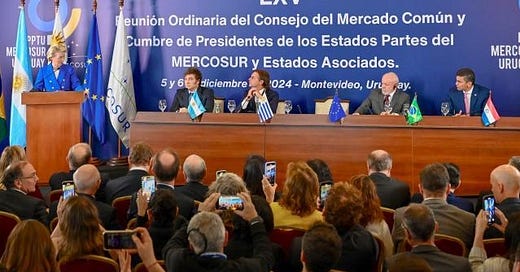Trade Policy
The European Union has reached a tentative free trade agreement with Mercosur, one which Austria has opposed in the past
Servus!
Last week, president of the European Commission Ursula von der Leyen marked the beginning of her second term in office by flying to Montevideo, Uruguay to conclude the EU’s long-running negotiations with Mercosur, the Southern Common Market, over a landmark free trade agreement. The bloc consists of five South American countries—Argentina, Bolivia, Brazil, Paraguay, and Uruguay—and covers almost 300 million people and a collective annual gross domestic product north of $5 trillion1.
This proposed agreement has been around 25 years in the making, negotiations having begun in 1999, regaining momentum in 2016 before coming to a first agreement in 2019. Discontent among EU member states caused Europe to revisit that initial bargain; five years later, the final draft is ready to go out to member states for their approval. To von der Leyen, the partnership agreement offers tremendous potential to the EU. She described it as a “win-win agreement, which will bring meaningful benefits to consumers and businesses on both sides” and “save EU companies €4 billion worth of export duties per year.”
Her statement also acknowledged, though, the uphill battle she now faces winning over the EU’s malcontents:
We have listened to the concerns of our farmers, and we acted on them. This agreement includes robust safeguards to protect your livelihoods. EU-Mercosur is the biggest agreement ever when it comes to the protection of EU food and drinks products. More than 350 EU products now are protected by a geographical indication. In addition, our European health and food standards remain untouchable. Mercosur exporters will have to comply strictly with these standards to access the EU market.
While Germany is in favor of the EU-Mercosur partnership agreement, France is opposed precisely because of what it could mean for Europe’s farmers. Also against are said to be Poland, the Netherlands—and Austria. Austria’s opposition dates back to that initial agreement in 2019 when, in the context of parliamentary elections, parliament’s EU subcommittee passed a resolution binding the government’s hands to vote against EU-Mercosur when ratifying the free trade agreement came up for a vote in Brussels2.
Opposition in Austria to EU-Mercosur comes from across the political spectrum and out of a constellation of concerns and worries. They focus primarily on agriculture, and what an influx of cheap meat and produce to the EU grown or manufactured in countries with lower labor standards may mean for Europe’s farmers. On the left, there are also somewhat esoteric concerns about the quality of that produce, including the use of pesticides and genetic engineering, and more meaningful ones about the impact of farming in countries like Brazil on the natural environment.
Austrian industry—which is in the doldrums at the moment—sees the benefits of EU-Mercosur, however. Since 2007, Austria has had an almost €7.5 billion trade surplus with Mercosur, and an agreement that removes trade barriers should provide a further boost in trade. Any decision on whether Austria will or will not oppose EU-Mercosur once it comes up for a vote in Brussels will only be taken once the country has a new government. Of the three parties currently in negotiations over forming a coalition, the liberal NEOS are likely to favor EU-Mercosur, the SPÖ oppose, and the ÖVP be divided between its various interest groups, agriculture versus industry and commerce. The Chamber of Commerce and the Confederation of Austrian Industry—both part of the ÖVP’s sphere of influence—are likely to lobby hard for the agreement; economic concerns—not just in Austria but Europe as a whole—may win the day in the end.
Bis bald!
Thank you for reading The Vienna Briefing. Nothing beats a personal recommendation; if you know someone who would be interested in reading this newsletter, consider sharing it with them today.
The Vienna Briefing is a reader-supported publication. Your one-time or monthly tips make my work on this newsletter possible and help keep it free for everyone.
Syrians After Assad
Interior minister Gerhard Karner announced his intention to halt asylum applications for Syrians in Austria following the downfall of the Assad regime in Damascus last week. The decision would affect some 40,000 Syrians with open asylum applications who arrived in Austria after 2020.
Abuse Of Office?
The Austrian Union of Jewish Students has sought to bring charges of abuse of office against president of the Austrian parliament Walter Rosenkranz. The move came after Rosenkranz failed to act on requests from state prosecutors in Vienna to lift three Freedom Party (FPÖ) MPs’ parliamentary immunity.
Blue-Black Is On Its Way
Talks between the FPÖ and ÖVP about forming a coalition government in Styria have entered their final stages. The future state government is expected to introduce stricter regulations for asylum seekers including benefits-in-kind in lieu of cash benefits and sanctions of those ‘unwilling to integrate.’
The EU, by comparison, has almost 450 million residents and an annual GDP of more than $28 trillion.
The deal requires approval from the European Parliament and the European Council. In the latter, it only needs a qualified majority; one country, i.e. Austria, cannot exercise a veto.





Curious that you shoudl choose to describe concerns that food may contain harmful contaminants as "esoteric". Maybe you don't mind eating hormones and pesticides but some poeple find this worrying.